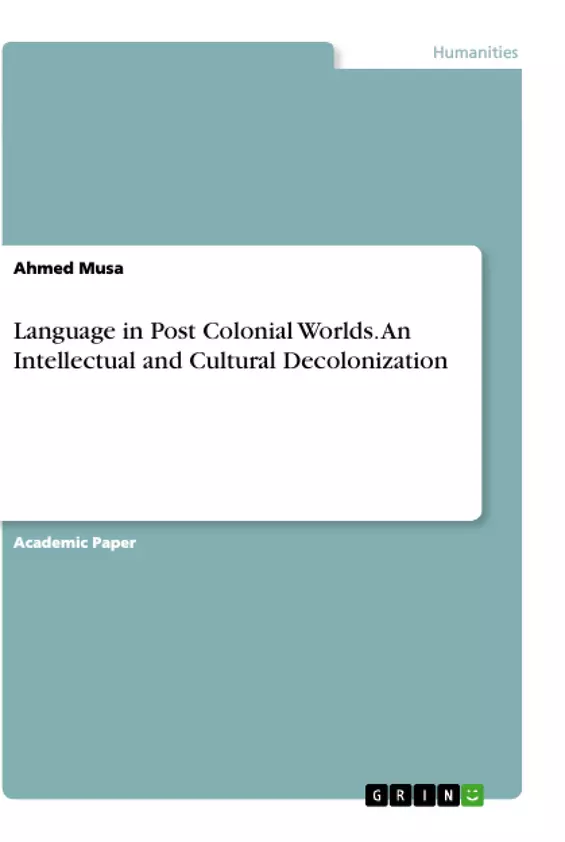This paper deals with the questions of language, intellectual and cultural decolonization in post colonial worlds.
The concern with cultural decolonization hails from different academic spheres, and as well as different geographical settings that either experienced European colonialism like in Africa, Asia or, from geographies with masses who were subjected to a forceful removal and enslavement and subsequently ferried from their indigenous homelands to Europe or America.
To decolonize culture in this context primarily means, to liberate language, identity, and the intellectual constellation of the colonized communities from the colonial experience that some/many believe to have suppressed and subjugated their cultural identities.
Inhaltsverzeichnis (Table of Contents)
- The Question of Language, intellectual and cultural decolonization in Post-colonial world.
- The Question of Language, intellectual and cultural decolonization in Post-colonial world.
- The Question of Language, intellectual and cultural decolonization in Post-colonial world.
- The Question of Language, intellectual and cultural decolonization in Post-colonial world.
- The Question of Language, intellectual and cultural decolonization in Post-colonial world.
Zielsetzung und Themenschwerpunkte (Objectives and Key Themes)
This text explores the complex and multifaceted relationship between language, culture, and decolonization in the postcolonial world. It investigates the challenges and possibilities of cultural liberation through the lens of language, examining how the colonial language, English, has been used both to perpetuate and to resist oppression.
- The impact of colonialism on language and cultural identity
- The role of language in achieving cultural liberation
- The debate on the use of foreign languages in postcolonial contexts
- The concept of a "third space" in language and culture
- The significance of African languages in shaping African identity
Zusammenfassung der Kapitel (Chapter Summaries)
The text begins by establishing the context of cultural decolonization, highlighting the desire for originality and authenticity in postcolonial literature. It then delves into the debate surrounding the use of colonial languages, exploring the perspectives of various writers like Toni Morrison, bell Hooks, and Audre Lorde. Morrison argues that English can be used for liberation purposes, while Lorde believes it is impossible to dismantle oppression using the tools of the oppressor. The text also examines the concept of a hybridized language, citing Derek Walcott's acceptance of a creole language as a means of expressing a unique Caribbean identity.
The text then shifts its focus to the African context, exploring the debate on whether European languages can be used to authentically express African experiences. It introduces Ngugi Wa Thiong'o's critique of the use of English, emphasizing his advocacy for the use of African languages to liberate African cultures. Ngugi's position is presented alongside opposing viewpoints, raising questions about the role of language in transmitting culture and the possibility of achieving cultural purity through the rejection of foreign languages.
Finally, the text explores Toni Morrison's analysis of American literature, highlighting how representations of African Americans have shaped American national identity. Morrison argues that the indirect, imagined, and subtextual meaning embedded in literary discourse can contribute to the construction of racial language. She suggests that the portrayal of African Americans in American literature has served as a foil against which white America defines itself.
Schlüsselwörter (Keywords)
This text revolves around the central themes of cultural decolonization, language, identity, and the complexities of postcolonial expression. It analyzes the use of colonial languages, particularly English, as a tool for both oppression and resistance. Key concepts explored include hybridity, cultural authenticity, linguistic liberation, and the role of language in shaping national identity. The text draws on the works of prominent figures like Toni Morrison, bell Hooks, Audre Lorde, and Ngugi Wa Thiong'o, highlighting diverse perspectives on the relationship between language and cultural decolonization.
- Quote paper
- Ahmed Musa (Author), 2021, Language in Post Colonial Worlds. An Intellectual and Cultural Decolonization, Munich, GRIN Verlag, https://www.hausarbeiten.de/document/1011971


